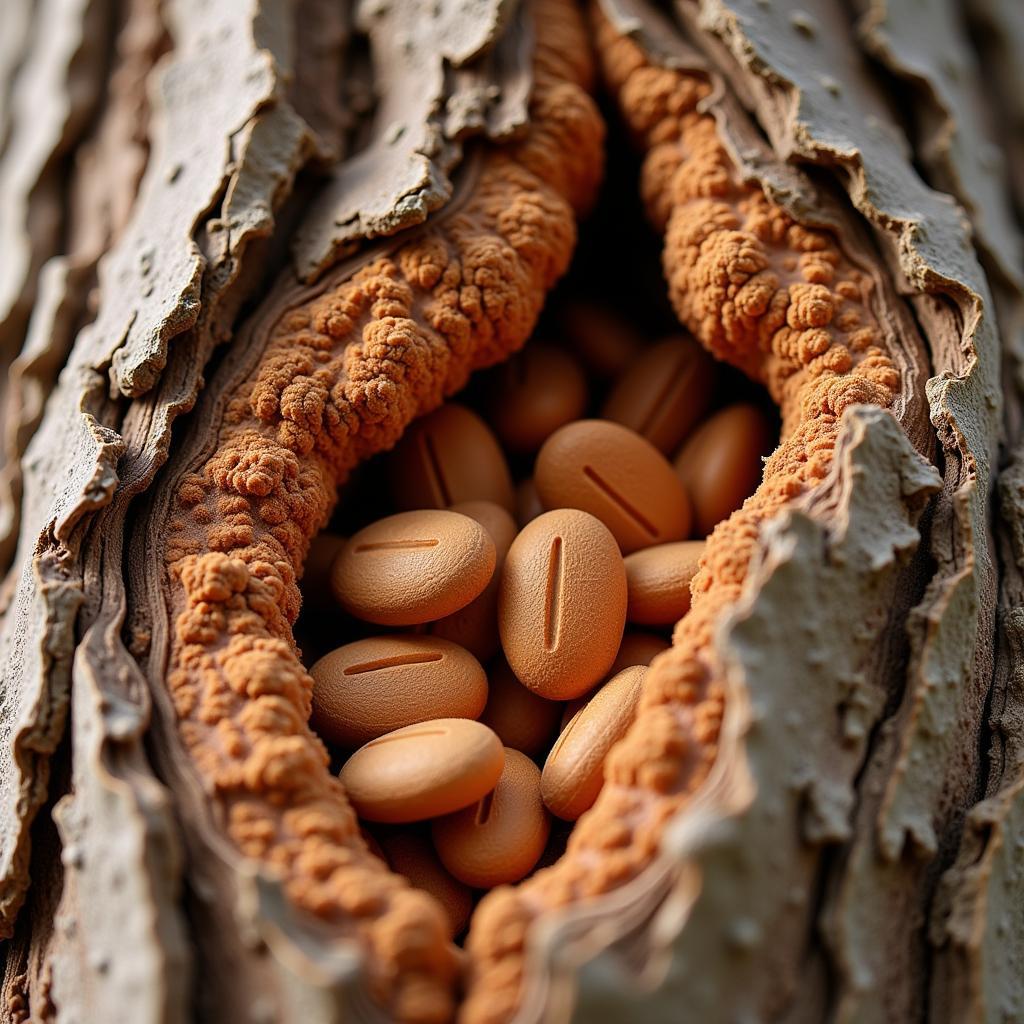Slippery Elm For Horses has gained popularity as a natural supplement for supporting digestive health. This versatile remedy, derived from the inner bark of the slippery elm tree (Ulmus rubra), is known for its soothing and protective properties. It has been used for centuries in both human and animal health, offering a gentle yet effective approach to addressing various digestive concerns.
Understanding the Benefits of Slippery Elm for Horses
Slippery elm bark contains mucilage, a slimy substance that becomes a gel-like consistency when mixed with water. This mucilage coats the digestive tract, providing a protective barrier and soothing irritated tissues. It can help to reduce inflammation and promote healing in the esophagus, stomach, and intestines. Additionally, slippery elm can help regulate bowel movements, easing both constipation and diarrhea.
For horses experiencing gastric discomfort, slippery elm can offer significant relief. Its demulcent properties help to protect the stomach lining from excess acid, reducing the risk of ulcers. Furthermore, slippery elm can stimulate mucus production, further enhancing the protective layer within the digestive system. This can be particularly beneficial for horses under stress, on medications, or experiencing dietary changes, all of which can contribute to digestive upset.
After this paragraph, insert the first shortcode for an image showing a horse eating hay supplemented with slippery elm bark powder.
How to Use Slippery Elm for Horses
Slippery elm for horses is typically available in powder form. It can be easily added to their feed or mixed with water to create a paste. The recommended dosage varies depending on the horse’s size and the specific condition being addressed. Always consult with your veterinarian before introducing any new supplement to your horse’s diet, including slippery elm. They can advise you on the appropriate dosage and ensure it won’t interact negatively with any existing medications.
When using slippery elm powder, it’s crucial to ensure it is properly mixed to avoid clumping. For horses with ulcers, you might consider using a best ulcer supplement for horses that contains slippery elm in combination with other beneficial ingredients. This can provide a more comprehensive approach to managing ulcers and supporting overall digestive health.
Slippery Elm for Horses with Colic
Slippery elm is often used as a supportive therapy for horses with colic. Its ability to soothe the digestive tract and reduce inflammation can help alleviate discomfort and promote healing. However, colic can be a serious condition requiring immediate veterinary attention. While slippery elm may offer some relief, it should not be used as a replacement for professional veterinary care. If your horse exhibits signs of colic, such as pawing, rolling, or looking at their flanks, contact your veterinarian immediately.
After this paragraph, insert the second shortcode for an image illustrating a horse owner mixing slippery elm powder with water.
 Horse Owner Mixing Slippery Elm Powder with Water
Horse Owner Mixing Slippery Elm Powder with Water
Remember, even if slippery elm provides some relief, you still need to consult with a veterinarian to determine the underlying cause of the colic and implement the appropriate treatment plan. Furthermore, incorporating appropriate gastric supplements for horses can be crucial for maintaining their digestive health in the long run.
Is Slippery Elm Safe for All Horses?
Slippery elm is generally considered safe for horses. However, like any supplement, it’s essential to use it responsibly. In rare cases, some horses may experience mild allergic reactions, such as skin irritation or digestive upset. If you observe any adverse effects after introducing slippery elm, discontinue use and consult your veterinarian.
“Slippery elm can be a valuable tool in supporting equine digestive health, but it’s crucial to use it appropriately and under the guidance of a veterinarian,” advises Dr. Emily Carter, DVM, specializing in equine internal medicine. “Proper diagnosis and a tailored treatment plan are essential for addressing specific digestive issues.”
What are the signs of digestive issues in horses?
Common signs of digestive problems in horses can include changes in appetite, weight loss, colic symptoms (pawing, rolling, flank watching), loose stools, or constipation.
After this paragraph, insert the third shortcode for an image showing a close-up of slippery elm bark.
 Close-up of Slippery Elm Bark
Close-up of Slippery Elm Bark
“Regularly monitoring your horse’s manure can provide valuable insights into their digestive health,” adds Dr. Carter. “Changes in consistency, color, or frequency can indicate potential problems.” Understanding and addressing the underlying causes of digestive upset are crucial. Using a slippery elm for horses with ulcers can be a supportive measure, particularly when combined with a comprehensive approach to digestive health management. You could also consider a measure stick for horses to accurately monitor their weight and identify any significant fluctuations. Considering appropriate sand for horse arena can also contribute to overall horse well-being.
Conclusion
Slippery elm for horses offers a natural and effective way to support digestive health. Its soothing and protective properties can help address various digestive concerns, from mild upset to more serious conditions like ulcers and colic. Remember to consult with your veterinarian before using slippery elm, especially if your horse has pre-existing conditions or is taking other medications. By incorporating slippery elm responsibly and as part of a comprehensive approach to equine wellness, you can help your horse maintain a healthy and happy digestive system.
FAQ
- Can I give my horse slippery elm every day? Consult your vet for appropriate dosage.
- How do I store slippery elm powder? Store in a cool, dry place.
- What are the side effects of slippery elm in horses? Side effects are rare but can include mild allergic reactions.
- Can slippery elm cure ulcers in horses? It supports healing but isn’t a cure. Veterinary care is essential.
- How quickly does slippery elm work for horses? Effects can vary, but some horses show improvement within a few days.
- Can I use slippery elm for my foal? Consult your vet before using any supplement on a foal.
- Where can I purchase high-quality slippery elm for my horse? Reputable feed stores and online retailers.
Need further support? Contact us! Phone: 0772127271, Email: [email protected] or visit us at QGM2+WX2, Vị Trung, Vị Thuỷ, Hậu Giang, Việt Nam. We have a 24/7 customer service team.